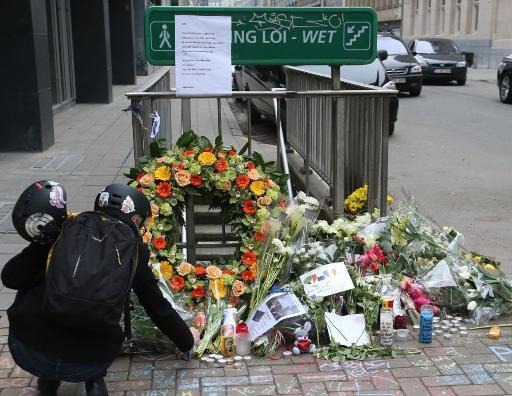A Brussels court on Monday will begin a preliminary session on the Brussels terrorist attacks in 2016, Belgium's deadliest peacetime attack. The case will try ten men for their alleged involvement in the attacks in a landmark trial that survivors hope will help them and Belgium move forward.
The accused are allegedly members of a unit of Islamic State (IS) which was responsible for both the March 2016 suicide attacks in Brussels and the November 2015 attacks in Paris. In Belgium, three suicide bombers struck Brussels airport and Maalbeek metro station, killing 32 and injuring hundreds.
The nine alleged terrorists, including the leader of the group French 32-year-old Salah Abdeslam, will face a range of charges. One of the accused is believed to have been killed in Syria but will be tried in absentia.
It will be Belgium's largest-ever trial, as 960 plaintiffs will be represented in the former offices of NATO.
Abdeslam has already been sentenced to life imprisonment in France for his part in the 2015 attacks in Paris and will not be present at Monday's initial hearing.
Seeking closure
Many of the victims and their families are expected to attend the trial. "My life was completely destroyed. I lost my friends and gave up my hobby as a pilot," said Philippe Vandenberghe, an airport manager who helped wounded travellers and now has post-traumatic stress disorder.
Although Vandenberge had a first aid certificate, he was unprepared for the carnage of the airport suicide bombs. He saw victims screaming while they were enveloped in smoke and is haunted by seeing two children lose their mother.
"I gave first aid to 18 different people. I'm sure that I saved one woman," the 51-year-old told AFP. He is now unemployed, following a legal dispute with his former employer and insurer due to medical bills. He paints, helps charities, and is training to drive ambulances.
Related News
- Brussels terror trial: The prosecution and defence
- Brussels attacks trial: Prosecution to arrest Farisi brothers
- Brussels terror attacks victims abroad will be able to follow trials online
Vandenberge will be in court on Monday, hoping that the trial will mark a new step: "We're hoping that our suffering will be recognised, that's the important part."
Not all victims and witnesses will go to the hearings. Police commander Christian De Coninck will watch the trial from home, sceptical of what the accused can offer.
"They're not worth my time to make the trip," he told AFP. "I don't want to hear them spouting rubbish about their unhappy childhoods, the influential imams, the duty to fight for the caliphate."
After Monday's hearing, the court will reconvene on 10 October to pick 12 jurors and 24 possible substitutes. Evidential hearings will then start on 13 October and are expected to last eight months, until June 2023.

